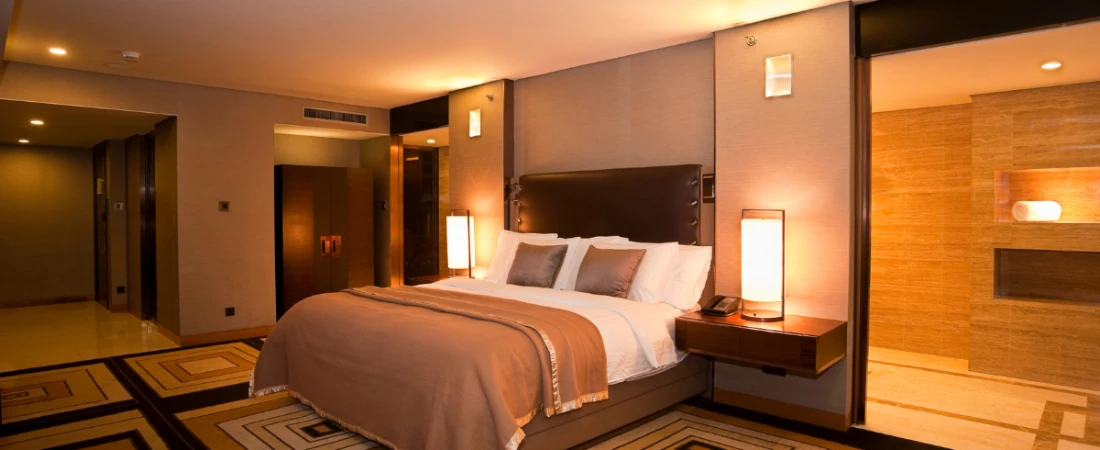
In today’s competitive, mobile, and tech-driven corporate landscape, where business trips are part of regular workflows, choosing the right hotel isn’t just about price or location. It’s about functionality, comfort, efficiency, and the ability to deliver a seamless work-travel experience. And that’s where the choice between boutique hotels and big hotel chains becomes more than just personal preference—it becomes a strategic decision for business travelers and corporate travel planners alike.
The growing number of boutique hotels in major cities reflects a shift in traveler preferences toward more localized, authentic experiences. These hotels promise charm, individuality, and personalized service. On the other hand, big chain hotels like Marriott, Hilton, Hyatt, and IHG dominate the corporate travel industry, known for their consistency, vast global presence, and comprehensive loyalty programs.
With corporate travel slowly bouncing back post-pandemic, and hybrid work models allowing for more flexibility, business travelers now have the power to be more selective. But which hotel type truly offers the best experience for work-related stays? Do boutique hotels provide the same professional standards and resources as big chain hotels? And do chains sacrifice uniqueness for reliability?
In this fact-driven blog, we’ll compare boutique vs. big chain hotels for business travel by evaluating tangible, data-backed elements such as room functionality, business services, loyalty benefits, safety, pricing, and location access. You’ll gain insights that go beyond general advice, helping you decide what works best depending on your travel style, company policy, and professional demands.
Let’s explore the key areas of comparison to determine which lodging option is better suited for your next business trip.
When choosing a hotel for business travel, the first priority is usually how well it supports your work-related needs—from high-speed internet to accessible workspaces, printing services, and meeting facilities.
Major hotel brands are built with business travelers in mind. Most properties offer standardized business amenities, including:
Reliable high-speed Wi-Fi
Business centers with printers, fax, and conference services
On-site meeting rooms and boardrooms
24-hour fitness centers for stress relief
Concierge and travel desk services
Multiple in-room power outlets and ergonomic workstations
For example, Hilton’s “WorkSpaces by Hilton” provides day-use rooms tailored for remote work. Marriott’s “M Club Lounge” offers upgraded services including snacks, drinks, and quiet workspaces reserved for elite members.
These features are especially important for frequent flyers and those attending conferences, making chains a safe bet for guaranteed professional-grade amenities.
Boutique properties may vary greatly in how they support business activities. While many newer or luxury boutique hotels have upgraded their infrastructure to attract corporate travelers, there’s still inconsistency. Some offer ultra-modern rooms with USB hubs and co-working areas, while others focus on design over function, lacking proper workspaces or fast internet.
However, boutique hotels in business hubs such as New York, London, and Singapore often cater well to remote workers and executives, offering:
Curated in-room tech experiences
Stylish lounges doubling as workspaces
Personalized concierge assistance
Local networking events or wine socials
According to a 2023 Expedia Business Travel survey, 43% of frequent business travelers said boutique hotels provided “a more inspiring workspace” compared to standard chains. However, only 28% said they found the amenities more reliable.
If reliable business services and infrastructure are essential, big chains outperform due to consistency. Boutique hotels can offer unique, inspiring workspaces but may lack standardization across properties.

Loyalty is currency in the world of business travel. Corporate travelers rack up points, earn elite status, and unlock perks that translate into real benefits—free upgrades, lounge access, or even free nights.
Big Chain Hotels:
This is where chain hotels dominate. Their robust loyalty programs are designed to reward frequent travelers with tangible benefits and strong brand alignment. Leading programs include:
Each offers tiered memberships, allowing elite members access to:
Free room upgrades
Early check-in and late check-out
Free breakfast or club lounge access
Complimentary Wi-Fi
Guaranteed room availability
Chains also maintain corporate partnerships and negotiated corporate rates, allowing companies to save on volume bookings while employees earn rewards. These systems are integrated into global distribution systems (GDS), making corporate travel management seamless.
Boutique Hotels:
While traditionally boutique hotels lacked a unified loyalty system, this has started to change. Networks like Preferred Hotels & Resorts and SLH (Small Luxury Hotels of the World) allow some independent properties to pool rewards programs.
Still, the benefits are limited compared to global giants. Some boutiques offer email-based loyalty perks, such as discounts for repeat stays or free breakfast, but lack elite-tier benefits or points flexibility.
Moreover, boutique hotels don’t often have corporate booking integrations, which limits their appeal for enterprise-level travel planning.
Conclusion:
For frequent business travelers looking to maximize reward points and corporate benefits, big hotel chains are superior. Boutique hotels lag in loyalty infrastructure, though they’re evolving slowly in this area.

Being close to offices, convention centers, or transport hubs can make or break a business trip. Long commutes reduce productivity, and delays add stress.
One of the biggest advantages of major chains is geographic saturation. Marriott, for example, operates over 8,700 properties across 138 countries. This guarantees that wherever your meeting or event is, you’re likely to find a familiar brand nearby.
Consistent proximity to airports, financial districts, and conference centers
Easy access to rideshare pickup, valet parking, or shuttle services
Integrated booking with airline and travel platforms
Big chains are also known for fast, frictionless check-in processes through mobile apps, digital room keys, and automated booking updates.
Boutique hotels are often located in urban centers but sometimes favor less conventional or trendy neighborhoods. While this enhances cultural immersion, it may result in:
Longer commute times to corporate hubs
Limited late-night transport options
Fewer services like valet or airport shuttles
However, many boutique properties strategically position themselves near tech hubs, creative districts, or innovation zones, appealing to startup founders, freelancers, and remote executives.
There’s also a lifestyle advantage: boutiques tend to be near cafes, galleries, or co-working studios, allowing for a more “local” experience between meetings.
A 2024 Global Business Travel Report showed that 61% of remote entrepreneurs preferred boutique hotels because of their unique neighborhoods and cultural exposure, even if it meant sacrificing convenience.
Big chains win in terms of location efficiency and convenience, especially for traditional office visits or conferences. Boutique hotels offer experiential value but may introduce logistical trade-offs.

For business travelers who spend weeks away from home, comfort and service can significantly impact productivity and mood.
Consistency is the trademark of chain hotels. Guests can expect predictable room layouts, pillow menus, blackout curtains, and similar services across cities. However, service may sometimes feel impersonal due to:
High staff-to-guest ratios
Automated or app-based service interactions
Standardized decor lacking local flavor
However, higher-tier chain brands like JW Marriott, Conrad, or Park Hyatt provide more curated experiences with butler services, personalized amenities, and luxury bedding.
Some chains have recently improved personalization through AI-driven preferences saved across apps—for example, your preferred room temperature or pillow type.
Boutique hotels are renowned for their bespoke experience, intimate ambiance, and warm service. With smaller guest numbers, staff often greet you by name, remember your preferences, and tailor the service accordingly.
Rooms may feature:
Locally designed furniture
Hand-picked minibar items
Premium linens and curated art
Scent menus or locally sourced toiletries
Customer satisfaction scores are often higher at boutique hotels when it comes to comfort and personalized hospitality.
Yet, due to smaller teams, service can sometimes be slower or less responsive in emergencies or high-demand periods.
A J.D. Power hotel satisfaction study (2023) revealed boutique hotels scored 11% higher on “staff friendliness” but 9% lower on “problem resolution efficiency” compared to chains.
For a more personal and relaxing experience, boutique hotels shine. Chains win on operational efficiency and quick issue resolution but may lack personal warmth.

So, which is better for business travel—boutique or big chain hotels?
The answer depends on your travel goals, frequency, and company structure.
If you are part of a large organization with structured travel policies, need reliable business amenities, and want to earn loyalty points for future perks, big chain hotels offer unmatched consistency and corporate benefits. Their presence near airports and commercial zones, combined with app-driven services and predictable comfort, make them ideal for standard business trips and conferences.
On the other hand, if you value uniqueness, creativity, and personalization—perhaps you work in a startup, are self-employed, or simply seek a refreshing environment that inspires productivity—then boutique hotels can offer an unforgettable stay. While you might trade off some convenience or reward points, the cultural engagement, aesthetic design, and hands-on service can elevate your work experience.
Many modern business travelers are now blending both options depending on the trip type. A quick client meeting may call for a chain hotel near the airport, while a remote work week in a creative district could be best spent in a boutique hotel with a rooftop lounge and co-working area.
Ultimately, it’s about matching functionality with preference. There’s no universal winner, but by understanding what each type of hotel offers factually and strategically, you can make smarter, more satisfying business travel decisions.
As business travel evolves, flexibility, personalization, and comfort are becoming just as important as consistency and loyalty. The smartest travelers will learn to balance both worlds.
Lina Zhou is a globe-trotting travel writer from Chengdu, China. With a passion for hidden gems and cross-cultural experiences, she shares practical tips, visa guidance, and immersive stories from every corner of the world. When not exploring, she’s sipping tea while planning her next adventure.